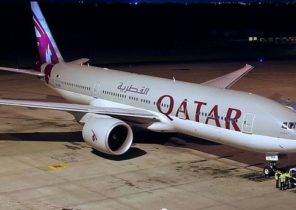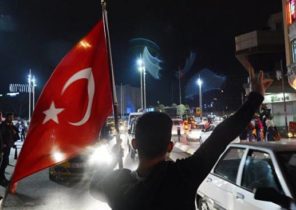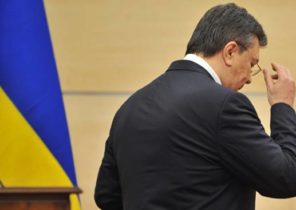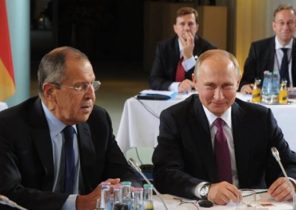We need to remember that the Northern neighbor of China tries to squeeze the maximum benefit from strengthening this country. Russia has certain concerns about the growing military power of China and long-term practice of copying foreign technologies. But she is extremely interested in the creation of a United front with Beijing as a counterweight to the West, and it outweighs her doubts. The question is for how long will remain this situation.
The Chinese economy begins to slow, however, China’s armed forces continue to grow stronger. The continued increase of military spending, supported by high economic growth, is beginning to yield dividends in the form of new technologies and newfound aggression. Beijing has made significant progress in the field of aviation, Navy and missile defense. And territorial claims in the South China sea, and the opening of the first overseas military base in Djibouti — it suggests that China is beginning to exert military influence on neighboring countries and more distant areas.
And how Russia regards these events? Although Moscow and Beijing to strengthen cooperation in all fields, many Western experts warned that the growing military power of China will increase tension between the two countries.
The editors of “national Interest” (The National Interest) has talked to several Russian military analysts and Chinese to better understand the attitude of Russia to increase the military power of the PRC.
“At the moment, our national interests coincide with the national interests of China, therefore improving the Chinese armed forces and military equipment are not worried about the Russian military command and political leadership,” said Professor of Russian University of peoples ‘ friendship Yuri Tavrovsky.
However, Tavrovsky recognizes that in Moscow there is a certain concern because of the increasing military power of China. “Ultimately, we are watching the progress of China and does not exclude any of the possible scenarios, as we remember how he changed the foreign policy of Beijing from the 1950s, years before the reform period under Deng seapine”, — he stressed.
An expert on China from Higher school of Economics Alexander Lukin stated the similar point of view. “My feeling is that [the Kremlin] is the understanding that China someday could be a problem. Now, however, those concerns were not significant when compared with the concerns of the West,” he told me.
“Speaking hypothetically, we can say this: if relations with the West were better relations with China could be different, — said Lukin. But since relations with the West do not improve, and is unlikely to be better, the trend towards closer cooperation with China will continue.”
In General, the Russian analysts whom managed to talk the editorial, do not think a military buildup of China is a direct threat. Chief editor of the magazine “Arsenal Fatherland” Victor murakhovski in conversation with me said that taken by China’s efforts clearly directed against Washington, and not against Moscow.
“If you look at this situation from a geostrategic point of view, China is not interested in expansion in the direction of Russia, but shows a very noticeable interest in ensuring its own security in the South China sea, and even further — in the Pacific ocean,” said he.
A common desire of Russia and China to create a counterweight to the United States have largely shaped the views of experts (from among those who were able to talk to the author) on newfound military power of China. Some even believe that this could be a boon for Moscow. According to taraskovo, Russia benefited from the rise of China, as it is able to more effectively challenge the United States.
“It’s one thing when Russia was the only strategic adversary of the West, he said. But now in national defense Strategy of the United States says about the two opponents, and therefore all the resources of America and the West must be divided into two countries”.
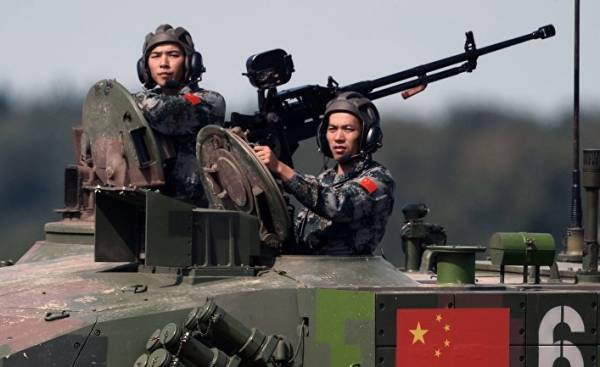 © RIA Novosti Maxim Blinov | go to fotoracconti China during competitions on tank biathlon
© RIA Novosti Maxim Blinov | go to fotoracconti China during competitions on tank biathlon
Tavrovsky said that the focus of the United States to contain China, “to a certain extent weakened the pressure on Russia”.
In Washington, a growing number of influential politicians and analysts expressed concern about the global military ambitions of Beijing. In Moscow, China is praised as a conservative and a responsible military power.
“While China is behaving very cautiously”, — said Lukin. He believes that China, given its current financial resources, could open a lot of military bases outside their territory, if they wanted to. However, the global military presence of China remains relatively low, and this, according to Lukin, suggests that the Chinese “are more interested in the solution of economic problems” than to expand its military influence in the world.
Lukin acknowledges that China, with its growing global economic interests is likely to rely increasingly on military force to achieve their goals. “But even if China will increase its military activity, he will need 100 years in order to be able to compare it with the power of the United States,” he said.
He further noted that even more active militarily China poses to Russia less of a threat than the West, as the foreign policy of Beijing is not as ideological as Washington.
“We know that the United States was bombing other countries, if they do not like; what the United States wants to establish democracy around the world, — said Lukin. And China is not going to establish Confucianism or communism in Russia.”
Russia has played an important role in equipping the new Chinese armed forces. According to the Stockholm international Institute of peace studies (Stockholm International Peace Research Institute), China was the largest buyer of Russian weapons in the period from 1999 to 2006. Thus, in 2005, China accounted for 60% of Russian arms exports. However, in subsequent years the share of Russian arms has significantly decreased. In 2012, it amounted to only 8.7%.
The main reason for this rapid reduction came from the growing concerns of Russia regarding the actions of the Chinese copying military hardware and weapons. So, in 1990-h years Moscow has sold to Beijing with some of its elite su-27, and then even gave China the license for their Assembly in the country. After some time, China abandoned the contract and used received in the Assembly of the su-27 technical knowledge to create your own fighter J-11, which is an almost exact copy of the Russian plane.
The arms trade between Russia and China in recent years has recovered somewhat. Moscow in 2015, has received a contract to supply the Beijing anti-aircraft missile systems s-400 and su-35, which is the most modern samples of Russian weapons. According to available information, Russia is also interested in selling to China’s new fifth generation fighter, the su-57.
Moscow has no illusions about the fact that China in the future will continue to copy Russian weapons. Project Director at Asian security from the Moscow analytical PIR center Vadim Kozyulin admitted in a conversation with me: “When we make deals with China, we always have in mind that China primarily wants to copy samples of our weapons.”
“The Russians are aware of this threat, however, ways of dealing with this problem is not so much”, he added.
But in this case, it is possible to explain the sudden change of the position of Moscow on the issue of arms trade with Beijing? According to Lukin, the political consequences of the conflict with the West over the annexation of Crimea by Russia in 2014 have made the Kremlin more compliant and willing to accept the costs from the close cooperation with China.
“Given the actions of the Russian leadership, we can say that Moscow has clearly decided it has no choice but to further rapprochement with China,” — said Lukin.
At the same time, Russian analysts are increasingly confident in the ability of his country to keep the innovative advantage and superiority in the field of military technology. Tavrovsky said that the theft of technology by Chinese people today causes less concern than it was in 1990-ies, and the reason is that “the Russian defense industry and R & d is now receiving adequate funding from the state.”
According to him, the Russian military-industrial complex today, “feeling pretty confident” and “supplies of modern samples of arms and military equipment to China, given that the equipment and layout delivered to the Russian armed forces equipment and weapons better that what we sell to China and other countries.”
Murakhovski also said that the Russian defense industry has many competitive advantages over the Chinese.
“When China say it is a huge country with a huge population, with a strong economy, with increasingly powerful armed forces, all’s right,’ he said. — However, it would be wrong to assume that we ourselves are so small and pathetic in comparison with China, and now we need to ask the Chinese to sell Russia some military technology. This is not so.”
“China will overtake Russia in the development of major military samples. We have a powerful military-technological potential, it is constantly improved, and we confidently look to the future”, — said murakhovski.
However, all the Russian experts with whom I’ve talked recognize that China is already ahead of Moscow in some areas. As an example, they cite the use of artificial intelligence in military applications, shipbuilding, production of drones, as well as the adoption of ballistic missiles to counter aircraft carriers.
In the near future, China could begin to sell weapons to Russia. According to Murakhovsky, “the acquisition from China of certain types of military equipment can be very beneficial for both countries.” In particular, he commends the acquisition by Russia of the Chinese drones and ships.
“China has a powerful shipbuilding industry. They are rapidly building their own destroyers and frigates, as if pies in the oven to bake. Every year they launched a few ships, and sent them into the sea, — said murakhovski. It is possible that we will arrange housing for our future vehicles in China because, as shown by our own experience of shipbuilding, we are building very slowly.”
Therefore, the Northern neighbor of China tries to squeeze the maximum benefit from strengthening this country. Russia has certain concerns about the growing military power of China and long-term practice of copying foreign technologies. But she is extremely interested in the creation of a United front with Beijing as a counterweight to the West, and it outweighs her doubts. The question is for how long will remain this situation.
